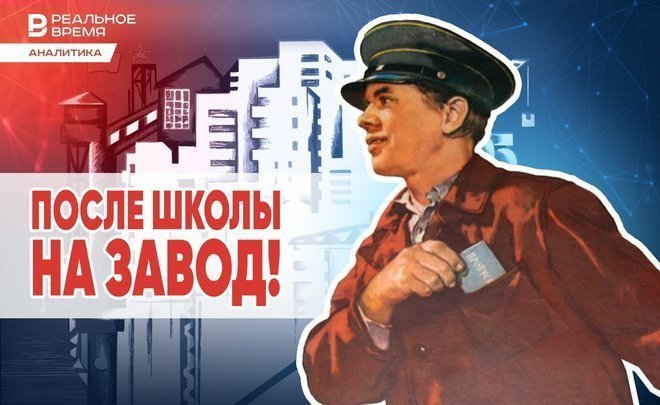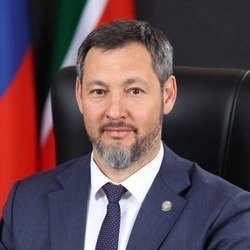Personnel issue, or Only couriers in the country
The analytical service of Realnoe Vremya figured out why there are a lot of couriers and pizza delivery men in Tatarstan, but few workers

Four thousand jobs remain vacant at Tatarstan factories operating in the defense industry. There are 0,7 resumes for one vacancy of working staff on hh.ru on average in Tatarstan. The most acute shortage is among turners, locksmiths, welders, and machinists. Why taxi drivers and couriers earn more today, how to restore prestige to working professions, and whether the WorldSkills movement saves the situation — read in the review of the analytical service of Realnoe Vremya.
A huge army of couriers does not suit Oleg Korobchenko
In February, Deputy Prime Minister of Industry and Trade of Tatarstan Oleg Korobchenko got into the newsmakers of the federal level, who offered to send couriers, pizza delivery men, and taxi drivers to factories.

To attract workers from other regions in Tatarstan, employers are reimbursed 12 minimum wages per employee, rental housing and dormitories are being built, but the shortage of workers remains a serious problem for the region, the minister noted.
The problem is not new
A clear shortage of workers has persisted for several years, but in recent months it has become even more acute, the press service confirmed hh.ru. The number of vacancies in the field of “Working personnel” in February 2023 increased by 10% compared to February last year, but the number of resumes decreased by 1%.
According to hh.ru, in Tatarstan in the category of “Working staff”, there are 0,7 resumes per vacancy. Among the most problematic areas — turners and locksmiths (0,5 resumes), as well as welders and machinists (0,9 resumes). At the same time, there is an average of 3,4 resumes per courier vacancy. There is no possibility to evaluate the competition by taxi drivers, but in general, there are 2,3 resumes for one driver vacancy.
The average proposed salary of workers, according to the service hh.ru, is 61 thousand rubles in Tatarstan — this is by 10 thousand rubles more than a year ago.

In general, a worker without experience in Tatarstan can expect a salary in the range from 55 thousand to 70 thousand rubles, and a highly qualified turner — 90-150 thousand rubles. For comparison: couriers can earn from 50 thousand to 120 thousand rubles.
Most schools can train no one except couriers
“For a 'huge army of couriers” to acquire a 'good profession and work in factories', only two small things are needed," SuperJob President Alexey Zakharov responded. “Firstly, to start educating children, starting from kindergartens and primary school. Teachers' salaries and their status today do not meet the requirements of today at all. The quality of education in most schools does not allow anyone to train except couriers. For 90% of children in the country, education ends in primary school. Secondary school and about 70% of universities are just a social kennel for young people. Secondly, to create conditions for the development of industry. And this is the tax policy, tariff policy, Central Bank rate. No business can solve such problems. We need a state policy designed for decades. A clear statement of very specific goals for the development of the country. There are no clear goals now.”

Oleg Korobchenko's declarations, in his opinion, do not contain any specifics. This “do everything” should be extremely clear and specific.
“For example, 'we should increase the salaries of primary school teachers five times in the next three years and raise the requirements for their qualifications three times, and this is what I will personally do' — it is clear what we are talking about here. 'We should reduce taxes for industrial enterprises twice this year and reduce the rates on loans for the development of industrial enterprises three times this year' — it is also clear what we are talking about," the expert cites an example.
Factories treat people as expendable material

Only a small number of graduates of technical specialties after university, having no work experience, can easily find a job by profession. And if they can, then with a very low salary. “I had an employee at the interview who in 2022, with full employment, earned 13,500 rubles," Almira Yakusheva said. “The level of salaries at many factories is very low and does not correspond to the realities of modern life.”
In production enterprises, according to Yakusheva, the processes of working with employees are also poorly organised, human resources departments do not understand that people are the main resource of the company and often treat them disrespectfully and mislead. “And when there are companies that understand the value of each employee, regardless of their skill level, and factories that treat people as expendable material, the choice is obvious," she is sure.
In their production, the majority of employees have a piecework salary. On average, packers earn 60-70 thousand rubles, radio installers — from 70 to 100 thousand rubles. The average level of wages in production is 60 thousand rubles.
According to the expert, it is important to solve the problem of shortage of workers systematically. “Conducting excursions to factories, open days for schoolchildren and students could increase the loyalty of young people to factories," Almira Yakusheva believes. “Willingness to accept students for internships would help them gain the necessary experience and skills. It is also important to equalise salaries to a decent level. There are many tasks, but it is not one-time actions that are more important, but systematic work from all sides.”
WorldSkills does not solve the problem
“The shortage of workers is very serious. The reasons for the short-term historical depth are obvious: many men have left, many are on the special military operation," explains Rustam Ganiev, the director general of PTK Engineering. “In general, the personnel problem is systemic, long-standing. Work at the plant in recent decades is not considered the most prestigious, and it is not very easy in principle. There are whole dynasties of factory workers where, for example, locksmithing is still being chosen from generation to generation, but there are very few of them and they are becoming fewer and fewer.”
Today, young guys often choose an easier path — they go into the service sector: couriers, taxi drivers. After all, you can earn the same amount, but you don't need specific skills.

At the same time, new production facilities are emerging today, modern and human-oriented, where you can earn well and build a career. “Fortunately, there are more such productions," the source notes. “But people still don't know much about them and don't look in our direction.”
“We indexed wages in 2022 and plan to in 2023. We see that prices are growing strongly. And we see that the wages that were in the market 2 months ago are no longer in the market. Now the average salary in our production is 78,800 rubles," Ganiev told Realnoe Vremya.
Manufacturers expect more measures from the state. “First of all, information support. It is important to popularise the prestige of working professions, which has not been done systematically for decades," emphasises Rustam Ganiev. “Periodic articles in departmental media do not solve this problem. And WorldSkills, unfortunately, too, although it is a wonderful initiative.”
Equally important is the development of interesting training programmes by modern standards, he believes. “Today there are no courses of working professions that are really interesting for young people, and there is no adequate modern communication with teenagers to promote at least existing courses," Rustam Ganiev believes. “It was as if the toxicity fleur was removed from vocational schools, renaming them colleges back in the 2000s, but it has obviously not worked out yet to make them a place where applicants want to get to.”
But factories are willing to pay
“There are indeed vacancies in some narrow specialties — a welder or a highly qualified electrician," Ildar Nizamutdinov, the deputy director general for personnel and social policy of Kazenergo JSC, confirmed to Realnoe Vremya. “We are a fairly large company: electricians, locksmiths, and welders work at our enterprise.”

According to him, there is also a certain personnel shortage in the service sector, and they are also looking for specialists who would suit them. “A good specialist is in demand everywhere today, and they are ready to offer him a decent salary," Ildar Nizamutdinov is sure.
A lot of young people work at Kazenergo today — a youth movement has been created at the enterprise, which unites employees by interests and helps to increase employee loyalty. The company actively cooperates with schools, Kazan Power Engineering College, and Kazan Power Engineering University.
“For the last 5-6 years, we have been popularising working specialties — electrician, welder, locksmith, starting from school. There are schools in Kazan, where children from the 5th-6th grade are already starting to make something with their own hands, assemble electrical circuits," the interlocutor gave an example. “And coming out of school, some of them have a certain category, because they win WorldSkills competitions. Today, college students are in great demand at many enterprises, like hot cakes. And they are offered a fairly high salary level. It may not be the same as that of top specialists. But factories are willing to pay. Mentoring and social support systems are developing there.”